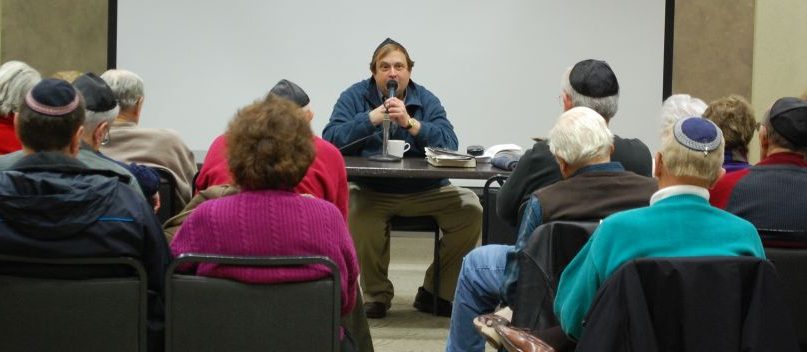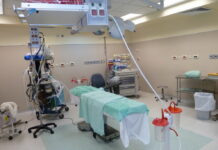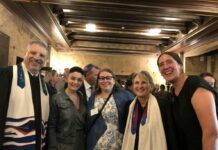
Of Congregation Beth El of Montgomery County’s 1,000 members, almost 300 of them — as well as other Jewish learners across the country — partake in the Bethesda synagogue’s Scolnic Adult Institute, an education program almost as well-established as the synagogue itself.
For the past 45 years, the Scolnic Adult Institute has offered about a dozen courses twice a year during its six-week semesters, though there are some exceptions, such as Hebrew courses, which have lasted decades.
The institute begins a new semester on March 14 and along with it, hopes to start a new chapter, beginning to think about how to transition from four semesters of Zoom-only courses and grow the student participants by appealing to younger congregants.
“One of the reasons that I joined the committee in the first place is to try and expand our reach,” said Deborah Wassertzug, chair of the Scolnic Adult Institute committee.
“My aim in joining the committee was to understand how courses get selected, to see if I could have some impact on engaging more students, by continuing to serve our core demographic of people who have always taken classes,” Wassertzug continued.
With 14 new classes and three new instructors, including two from Germany and Italy, respectively, Wassertzug hopes to attract fresh participants. Marcella Simoni, a professor at Università Ca’ Foscari Venezia, will teach “Jews in Asia: South, East and Southeast” about the various Jews — such as Baghdadi Jews in India and Singapore and Ashkenazi Jews who sought refuge in China — who lived in Asia in the 19th and 20th centuries.
Jake Schneider, who is teaching “Flying with the Golden Peacock: Migration in Yiddish Literature” is a translator and aspiring Yiddish poet who lives in a Yiddish-speaking community in Berlin. Beth El clergy, like in past semesters, will also teach courses: Rabbi Greg Harris will consider the controversial life and ideology of Rabbi Meir Kahane.
In the 21 years that Harris has been a rabbi at the Rockville congregation, the Scolnic Institute has been a prominent feature.
“It is a foundational value of the congregation to learn and study and to come together as a community,” he said.
For as long as congregants have been members of Beth El, they’ve remembered robust adult education offerings. Created about 45 years ago, the institute was initially called the Saul Bendit Adult Institute and was renamed in 2013 to honor Rabbi Samuel Scolnic, the congregation’s first spiritual leader.
Stephanie and Jack Ventura joined Beth El in 1993 after seeing an ad for the synagogue’s adult learning program in Washington Jewish Week. They both served as chairs of the institute’s committee in their 30 years at Beth El.
We were always fascinated by the offerings,” Jack Ventura said. “I once said, ‘Wow, what a program!’ Sure enough, when we came on board, we couldn’t wait to get involved with it.”Even 30 years ago, the institute was popular; the Venturas remember about 200 other students when they joined. The institute’s success, according to Jack Ventura, has been its consistency.
“In a sense, the program has been strong, not because of the many changes, but because it’s been fairly stable in terms of the way it’s run,” he said.
Wassertzug’s mother, Marta Wassertzug, saw firsthand the institute’s popularity and impact. After joining Beth El in 1968, Marta Wassertzug was a Hebrew school teacher, then music teacher. Born in Argentina and emigrating from Israel, Wassertzug began teaching Hebrew at Beth El in 1978. Even then, the budding adult learning program was organized into six-week sessions.
Marta Wassertzug quickly learned that was not enough time to teach her students a new language, and extended the course, which lasted about 35 years and took the class with her to the JCC where she worked, when she became too busy to continue teaching at Beth El. Her students were able to read Israeli newspapers and novels by the end of the course. When the synagogue renamed the institute after Scolnic in 2013, they invested deeply in the program.
“That enables them to really be a much higher caliber program and reach out beyond the immediate synagogue,” Stephanie Ventura said.
As the pandemic quiets, Beth El is once again at a crossroads of how to adapt and expand the Scolnic Institute, but there’s never been any question of its significance to the synagogue. Open to students around the world, the Scolnic Adult Institute, according to its leadership, has demonstrated the importance of learning to Jewish tradition and culture.
Said Marta Wassertzug, “That’s the only way to widen your horizons.” ■





